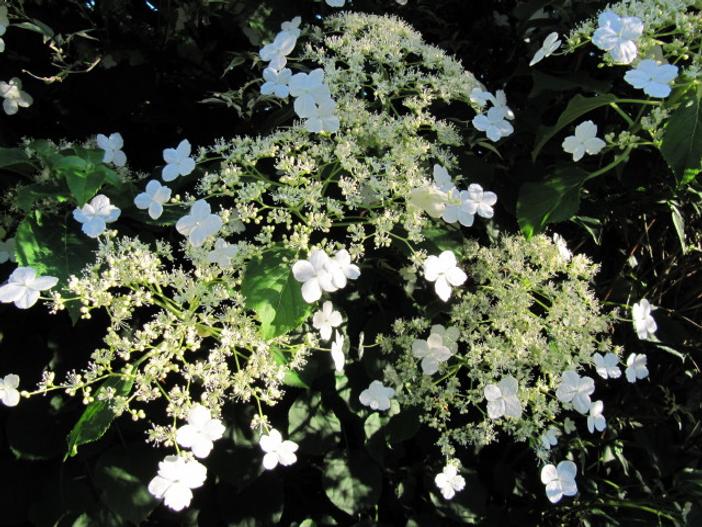Climbing Hydrangea
(Hydrangea petiolaris)
Climbing Hydrangea (Hydrangea petiolaris)
/
/

Leonora (Ellie) Enking
CC BY-SA 2.0
Image By:
Leonora (Ellie) Enking
Recorded By:
Copyright:
CC BY-SA 2.0
Copyright Notice:
Photo by: Leonora (Ellie) Enking | License Type: CC BY-SA 2.0 | License URL: https://creativecommons.org/licenses/by-sa/2.0/ | Uploader: wallygrom | Publisher: Flickr

































Estimated Native Range
Summary
Hydrangea petiolaris, commonly known as Climbing Hydrangea, is a deciduous perennial vine native to woodland areas, forest edges, and rocky outcrops in Japan, the Korean Peninsula, and parts of eastern Siberia. It can grow to a height of 30-50 feet (9-15 meters) with a spread of 5-6 feet (1.5-1.8 meters), and it clings to surfaces with aerial rootlets. The vine is known for its lush green foliage and flat-topped, creamy white lacecap flowers which bloom in late spring to early summer and are moderately showy. The bark on mature stems exfoliates to reveal a reddish-brown inner bark, adding winter interest.
Climbing Hydrangea is valued for its ability to thrive in shaded conditions where other vines may struggle, making it an excellent choice for north-facing walls and shaded garden spots. It is often used to cover unsightly structures, as a ground cover, or to add vertical interest in the landscape. This plant prefers moist, well-drained soils with high organic content and benefits from mulching. While it is slow to establish, once settled, it requires minimal maintenance and is relatively free of serious pests and diseases. Climbing Hydrangea can be used to attract pollinators and provide habitat for birds.CC BY-SA 4.0
Climbing Hydrangea is valued for its ability to thrive in shaded conditions where other vines may struggle, making it an excellent choice for north-facing walls and shaded garden spots. It is often used to cover unsightly structures, as a ground cover, or to add vertical interest in the landscape. This plant prefers moist, well-drained soils with high organic content and benefits from mulching. While it is slow to establish, once settled, it requires minimal maintenance and is relatively free of serious pests and diseases. Climbing Hydrangea can be used to attract pollinators and provide habitat for birds.CC BY-SA 4.0
Plant Description
- Plant Type: Vine
- Height: 30-50 feet
- Width: 5-6 feet
- Growth Rate: Moderate
- Flower Color: White
- Flowering Season: Spring, Summer
- Leaf Retention: Deciduous
Growth Requirements
- Sun: Part Shade, Full Shade
- Water: Medium
- Drainage: Medium
Common Uses
Bank Stabilization, Bee Garden, Butterfly Garden, Deer Resistant, Drought Tolerant, Fragrant, Rabbit Resistant, Salt Tolerant, Showy Flowers, Street Planting
Natural Habitat
Woodland areas, forest edges, and rocky outcrops in Japan, the Korean Peninsula, and parts of eastern Siberia
Other Names
Common Names:
Scientific Names: , Hydrangea anomala subsp. petiolaris, Hydrangea petiolaris, Hydrangea scandens, Calyptranthe petiolaris, Hydrangea petiolaris var. cordifolia, Hydrangea cordifolia, Hydrangea tiliifolia, Hydrangea petiolaris var. ovalifolia, Calyptranthe petiolaris var. cordifolia
GBIF Accepted Name: Hydrangea anomala subsp. petiolaris (Siebold & Zucc.) E.M.Mc Clint.